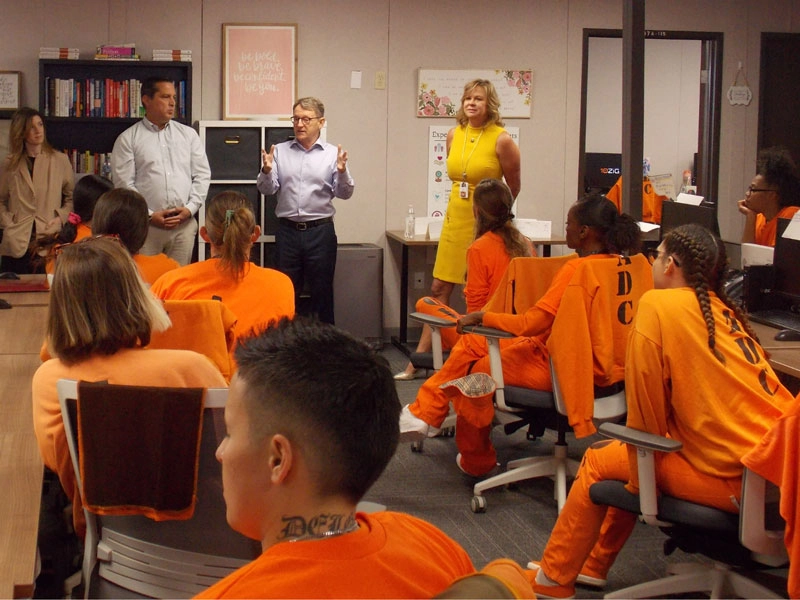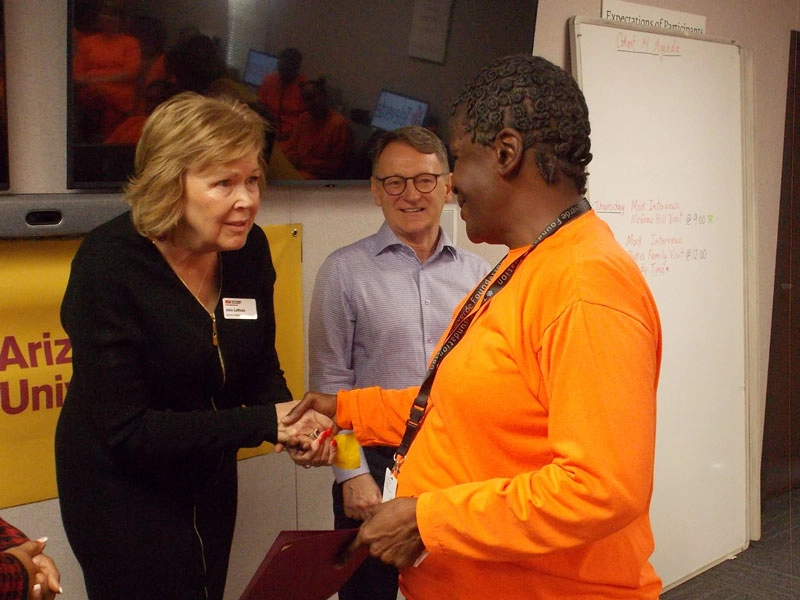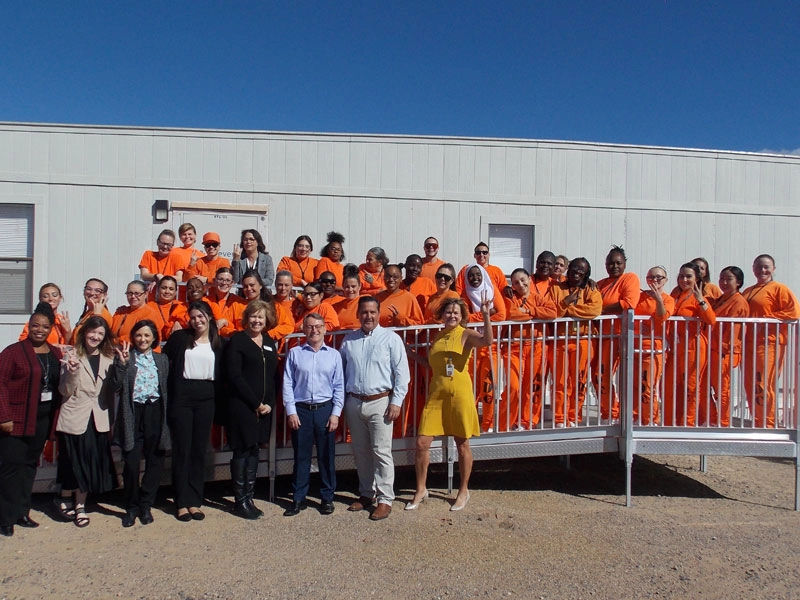My Account Details
A Fresh Start: How a Unique Education Program is Helping Women Forge a New Path After Prison
Offered by the Televerde Foundation and Arizona State University with support from McGraw Hill, Career PATHS gives incarcerated women an opportunity for an education – and so much more.

When Fatuma H. was accepted into the Career PATHS program at Arizona State Prison - Perryvile, learning about business was the last thing on her mind. It had been years since she was in school, and she wasn’t even sure she was capable of learning anymore. Still, she recognized what the program offered: an opportunity to start building her future. In June of 2024, she began PATHS, turning the page on a new chapter of her life.
Fatuma says she was hooked on the program from day one. She quickly discovered skills and passions she never knew she had, like sales and public speaking. “Every single time I achieved something, it was a notch in my belt,” she says. “Then my confidence grew, and then I ventured out a little more into other areas, like project management. Now, I can actually envision a career in so many different things because these skills are transferrable.”
By the time she finished the program in December 2024, she was ready to tackle a new goal: earning a college degree.
An education — and so much more
Offered by the Televerde Foundation and Arizona State University (ASU) in partnership with McGraw Hill, Career PATHS (Prepare Achieve and Transform for Healthy Success) offers incarcerated women two college-level courses in business basics and professional communications, such as conducting negotiations, managing people and finances and making presentations. Prospective students must apply for one of the 40 seats available. Most women are a year or so away from their release date, so having these types of skills can go a long way toward helping them transition successfully from prison to the workforce.
In many ways, PATHS works like any other college course. For six months, students attend class over Zoom for three hours every week. (Instructors make in-person visits a few times throughout the year.) Using course materials and digital education tools supplied by McGraw Hill, they do homework, take tests and receive grades. They can earn certifications in sales, customer service or computer tech, and even turn completed work into credits at ASU.
But a closer look reveals a program that prioritizes personal development. Through essays, assignments and projects, students learn how to set boundaries, dismantle destructive behaviors, recognize healthy relationships and cultivate positive habits that will serve them long after they leave the prison.
Key to this is helping students develop self-efficacy, or a belief in one’s own capabilities. Five facets of the program, called PROVED, are designed to promote this, says Dr. Julia LaRosa, an ASU professor who co-developed the program with the Televerde Foundation in 2020. These include the ability to see yourself be successful (Performance); form lasting relationships with other women in the program (Relationships); care for your mind, body and spirit (One); meet with and learn from program graduates (Vicarious Experiences); and set tangible goals for life after prison (Dreams).
While each component is important, Dr. LaRosa considers Performance the most critical. And she believes the resources McGraw Hill provides, which include the Connect digital learning platform, have contributed to the students’ success. Connect uses a mix of up-to-date content and adaptive learning tools to identify knowledge gaps and personalize learning for each student. As Fatuma discovered, that level of customization helped her study more efficiently. “Knowing the areas I was struggling with and needed to focus on made things a lot easier,” she adds.
Oonagh McQuarrie, programs director at Televerde Foundation, agrees. “The thing that’s so magical about the Connect platform is that it shows people how to learn. It says, ‘Hey, here’s where you need to focus. But don’t worry about that part — you’ve already got it,’” she says. “For anyone going through the program, it’s learning that you’re able to learn. You can actually do this if you set your mind to it.”

A brighter future
Now working with its 16th cohort, PATHS has already posted an impressive track record. None of the women who have completed the program have been re-incarcerated. (By comparison, recidivism rates for women in general are 63%, according to the Women’s Justice Commission.) PATHS graduates also tend to make more money when they’re released, with salaries that are 61% to 75% higher than less-prepared peers, according to the Televerde Foundation.
What’s more, the women tend to finish the program feeling more confident in themselves and their futures. “That joy you see in them is because they’ve stepped into the fullness of who they are,” Dr. LaRosa says.
The positive impact this has on families can be significant and far-reaching. Dr. LaRosa remembers one student who decided to take college courses after finishing PATHS. Soon after, the woman’s 25-year-old son enrolled in college, too. “We have data that support this: that as the women find success, it ripples down to their kids, and they engage in education and success,” she adds.
Doing the hard work in PATHS can also go a long way toward repairing and rebuilding relationships with loved ones. Ashlee Liberty, for instance, had no relationship with her daughter when she was released from Perryville. Motivated by her success in PATHS, she went on to pursue a degree at ASU. Her daughter, also an ASU student, often came over for homework dates.
Today, Ashlee is a program specialist at the Televerde Foundation and is closer than ever with her daughter, now 20. “I just spent a week in Arizona at her house, and we talk on the phone all the time,” Ashlee says. “She’s my best friend.”
Though she has seven more years on her sentence, Fatuma is starting to envision her life on the outside. And it’s a happy one. She wants to parasail in Turkey, go to the Kentucky Derby, try her hand at archery and have a good relationship with her family. She knows turning these dreams to reality takes hard work. But, she says, PATHS has given her the tools and techniques she needs to be successful. “[After I’m released], I’ll still be doing things like the vision boards, smart goal setting and public speaking, and I’m going to continue my education,” she says. “This program is in my heart forever. It’s changed my life.”
